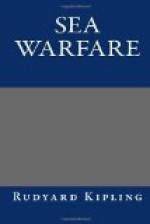Yet that insolence springs naturally and unconsciously as an oath, out of the same spirit that caused the destroyer to pick up the dog. The reports themselves, and tenfold more the stories not in the reports, are charged with it, but no words by any outsider can reproduce just that professional tone and touch. A man writing home after the fight, points out that the great consolation for not having cleaned up the enemy altogether was that “anyhow those East Coast devils”—a fellow-squadron, if you please, which up till Jutland had had most of the fighting—“were not there. They missed that show. We were as cock-ahoop as a girl who had been to a dance that her sister has missed.”
This was one of the figures in that dance:
“A little British destroyer, her midships rent by a great shell meant for a battle-cruiser; exuding steam from every pore; able to go ahead but not to steer; unable to get out of anybody’s way, likely to be rammed by any one of a dozen ships; her syren whimpering: ’Let me through! Make way!’; her crew fallen in aft dressed in life-belts ready for her final plunge, and cheering wildly as it might have been an enthusiastic crowd when the King passes.”
Let us close on that note. We have been compassed about so long and so blindingly by wonders and miracles; so overwhelmed by revelations of the spirit of men in the basest and most high; that we have neither time to keep tally of these furious days, nor mind to discern upon which hour of them our world’s fate hung.
THE NEUTRAL
Brethren, how shall it fare
with me
When the war is
laid aside,
If it be proven that I am
he
For whom a world
has died?
If it be proven that all my
good,
And the greater
good I will make,
Were purchased me by a multitude
Who suffered for
my sake?
That I was delivered by mere
mankind
Vowed to one sacrifice,
And not, as I hold them, battle-blind,
But dying with
opened eyes?
That they did not ask me to
draw the sword
When they stood
to endure their lot,
What they only looked to me
for a word,
And I answered
I knew them not?




